COST webinar
 UKRO will be holding a webinar ‘An Introduction to COST” on 17 March 2022 (11:00-12:30pm UK time). COST (European Cooperation in Science and Technology) is a funding organisation that aims to support researchers, in any sector and at all career stages, to grow their professional research networks and boost their careers. COST Actions are open to all science and technology fields, including new and emerging fields and help to connect research initiatives across Europe and beyond.
UKRO will be holding a webinar ‘An Introduction to COST” on 17 March 2022 (11:00-12:30pm UK time). COST (European Cooperation in Science and Technology) is a funding organisation that aims to support researchers, in any sector and at all career stages, to grow their professional research networks and boost their careers. COST Actions are open to all science and technology fields, including new and emerging fields and help to connect research initiatives across Europe and beyond.
The webinar is aimed at researchers and research support staff, interested in finding out more about COST funding opportunities. The event will also outline the different ways to get involved in a COST action and will cover UK participation in COST. Attendance is free of charge, but participants should register here.
MSCA Postdoctoral Fellowships 2022 Call Information Webinar Series
 The UK Research Office (UKRO), in its capacity as UK National Contact Point for the Horizon Europe Marie Skłodowska-Curie Actions (MSCA), will be holding a series of information webinars for organisations and individuals interested in applying to the 2022 MSCA Postdoctoral Fellowships Call (call opens 13 April 2022, call deadline 14 September 2022).
The UK Research Office (UKRO), in its capacity as UK National Contact Point for the Horizon Europe Marie Skłodowska-Curie Actions (MSCA), will be holding a series of information webinars for organisations and individuals interested in applying to the 2022 MSCA Postdoctoral Fellowships Call (call opens 13 April 2022, call deadline 14 September 2022).
Postdoctoral Fellowships help experienced researchers advance their careers and gain new skills through training, international, intersectoral and international mobility. Postdoctoral Fellowships are aimed at researchers who are already in possession of a doctoral degree, and at the call deadline have a maximum of 8 years full-time equivalent research experience.
BU has excellent track record in applying for MSCA fellowships and we encourage those considering to apply for the first time to register and participate in these webinar series.
I would like to remind BU academics that MSCA calls are one of exceptions regarding submission of Intention to Bid forms; RDS my require to submit ItB up to two months before the submission deadline. Please get in touch with your RDS Funding Development Officer as soon as possible if you plan to apply to 2022 MSCA PF call.
ERC 2022 Advanced Grant Webinar Slides and Recording Available
 The presentation slides and video recording from UKRO ERC Advanced Grant Webinar are now available for the two sessions and can be accessed on the UKRO event page.
The presentation slides and video recording from UKRO ERC Advanced Grant Webinar are now available for the two sessions and can be accessed on the UKRO event page.
Tentative Dates for ERC 2023 Calls are Announced
The European Research Council (ERC) has published the tentative deadline dates for the 2023 calls. Note that these deadlines will not be confirmed until the 2023 ERC Work Programme is officially published over the summer.
ERC calls are another exception regarding submission of ItB forms; RDS my require to submit ItB at least three months before the submission deadline. Please get in touch with your RDS Funding Development Officer as soon as possible if you plan to apply to ERC 2022 Advanced Grant or ERC 2023 Starting Grant (submission deadline in 2022) call.
I would like to also remind that all BU researchers can access the UKRO Portal as employees of the subscribing institution to read news articles, factsheets and other useful information. Anyone with an institutional email address can register. To access some links above, you may be required to be UKRO registered user.

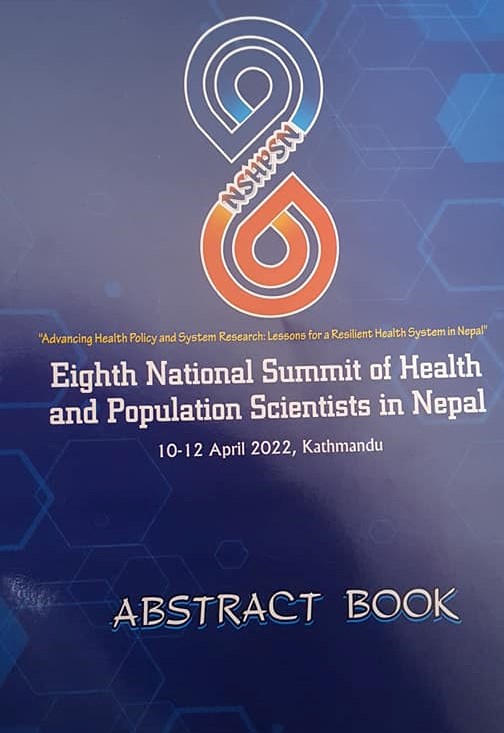 Today say the start of the Eight National Summit of Health & Population Scientists in Nepal. Bournemouth University is involved in two presentation. The first will be one by University of Huddersfield PhD student Tamang Pasang, and her supervisors Prof. Padam Simkhada (FHSS Visiting Faculty), Dr. Bibha Simkhada (former BU Lecturer in Nursing and current FHSS Visiting Faculty) and Prof. Edwin van Teijlingen. Pasang will be talking about her thesis fieldwork: ‘Impact of Federalisation in Maintaining Quality of Maternal and Neonatal Care in Nepalese Health System’.
Today say the start of the Eight National Summit of Health & Population Scientists in Nepal. Bournemouth University is involved in two presentation. The first will be one by University of Huddersfield PhD student Tamang Pasang, and her supervisors Prof. Padam Simkhada (FHSS Visiting Faculty), Dr. Bibha Simkhada (former BU Lecturer in Nursing and current FHSS Visiting Faculty) and Prof. Edwin van Teijlingen. Pasang will be talking about her thesis fieldwork: ‘Impact of Federalisation in Maintaining Quality of Maternal and Neonatal Care in Nepalese Health System’.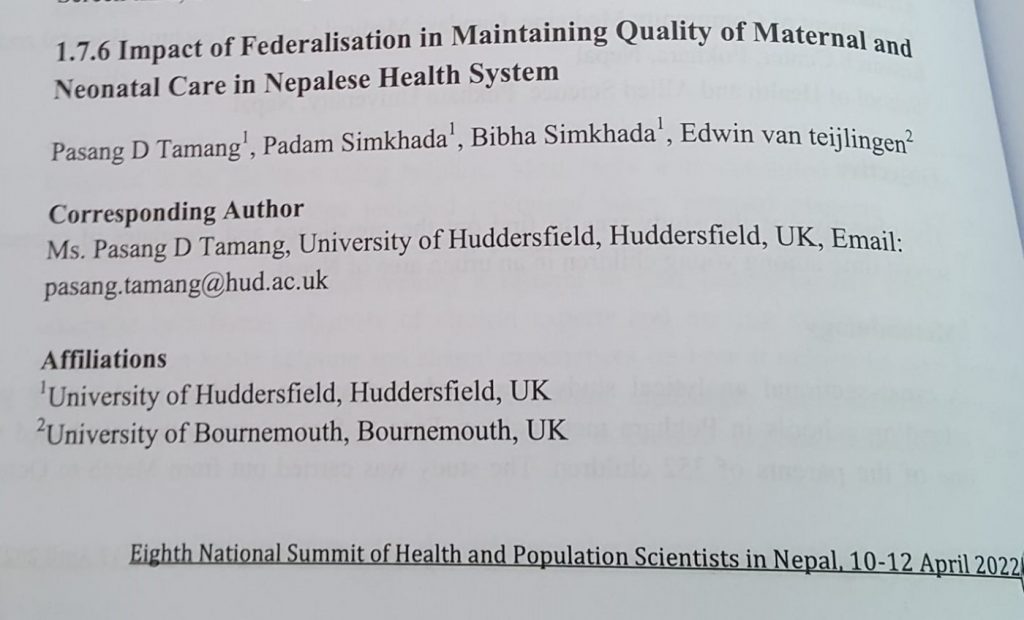
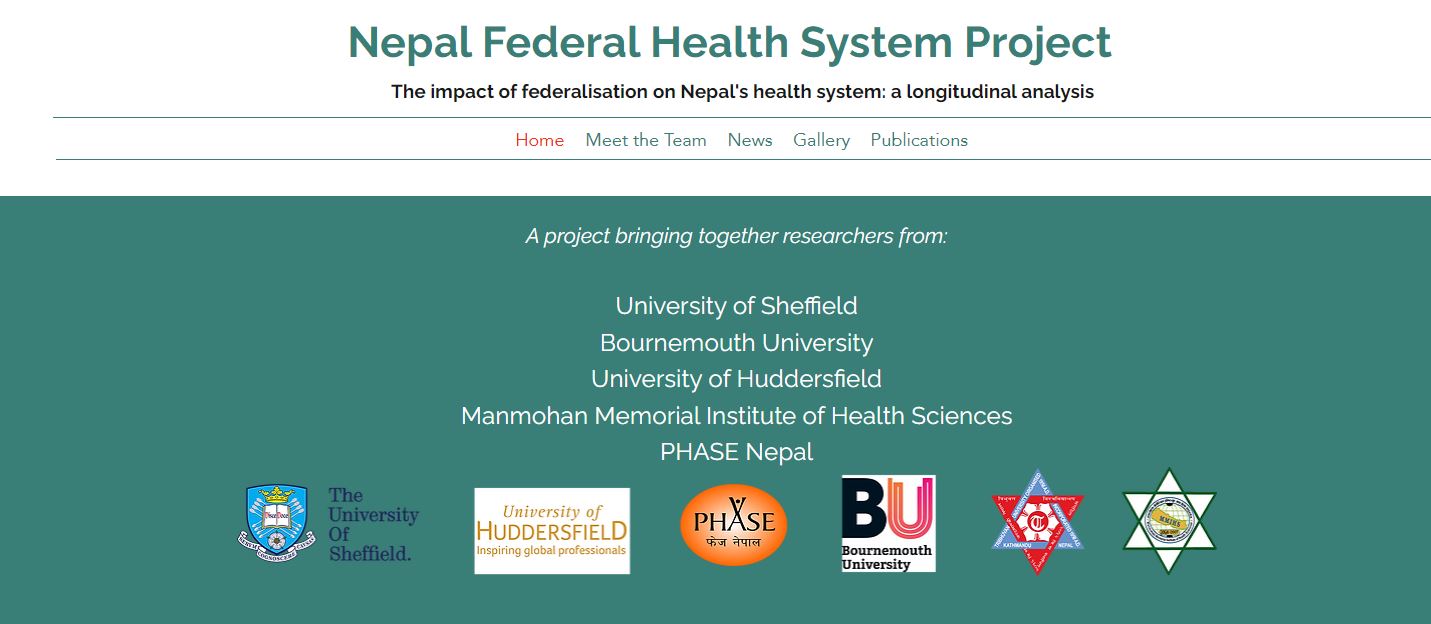


 On 15 March, 2022 science minister George Freeman extended the guarantee to awards that are expected to be signed by the end of December 2022, while efforts continued to associate to the programme. The announcement comes after yesterday’s news that the business department has allocated £6.8 billion for EU programmes during 2022-2025, supporting the UK’s eventual association with Horizon Europe, Euratom Research and Training, and Fusion for Energy.
On 15 March, 2022 science minister George Freeman extended the guarantee to awards that are expected to be signed by the end of December 2022, while efforts continued to associate to the programme. The announcement comes after yesterday’s news that the business department has allocated £6.8 billion for EU programmes during 2022-2025, supporting the UK’s eventual association with Horizon Europe, Euratom Research and Training, and Fusion for Energy. UKRO will be holding a webinar ‘An Introduction to COST” on 17 March 2022 (11:00-12:30pm UK time). COST (European Cooperation in Science and Technology) is a funding organisation that aims to support researchers, in any sector and at all career stages, to grow their professional research networks and boost their careers. COST Actions are open to all science and technology fields, including new and emerging fields and help to connect research initiatives across Europe and beyond.
UKRO will be holding a webinar ‘An Introduction to COST” on 17 March 2022 (11:00-12:30pm UK time). COST (European Cooperation in Science and Technology) is a funding organisation that aims to support researchers, in any sector and at all career stages, to grow their professional research networks and boost their careers. COST Actions are open to all science and technology fields, including new and emerging fields and help to connect research initiatives across Europe and beyond. The UK Research Office (UKRO), in its capacity as UK National Contact Point for the Horizon Europe Marie Skłodowska-Curie Actions (MSCA), will be holding a series of information webinars for organisations and individuals interested in applying to the
The UK Research Office (UKRO), in its capacity as UK National Contact Point for the Horizon Europe Marie Skłodowska-Curie Actions (MSCA), will be holding a series of information webinars for organisations and individuals interested in applying to the  The presentation slides and video recording from UKRO ERC Advanced Grant Webinar are now available for the two sessions and can be accessed on the
The presentation slides and video recording from UKRO ERC Advanced Grant Webinar are now available for the two sessions and can be accessed on the 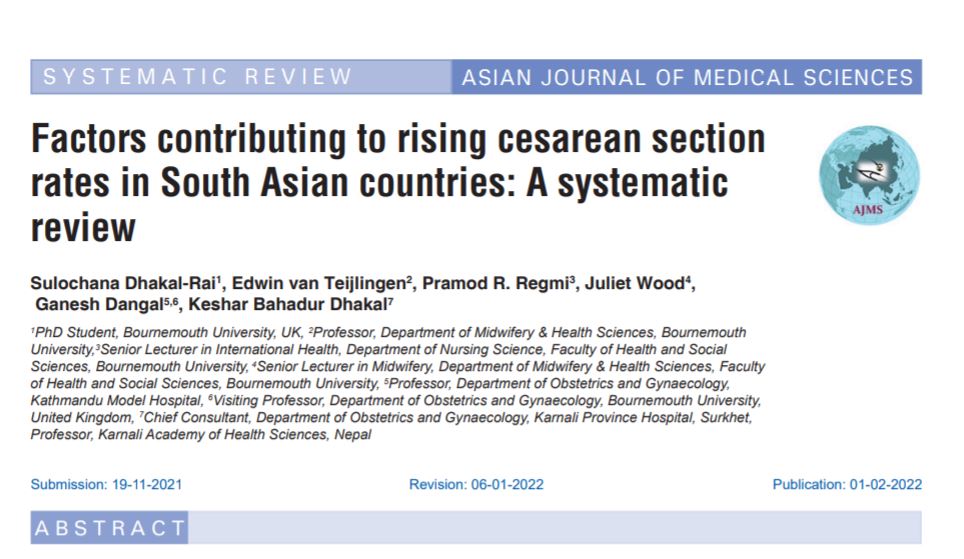 Congratulations to Bournemouth University’s PhD student Sulochana Dhakal-Rai on the publication today of the latest paper from her research thesis. This latest paper ‘
Congratulations to Bournemouth University’s PhD student Sulochana Dhakal-Rai on the publication today of the latest paper from her research thesis. This latest paper ‘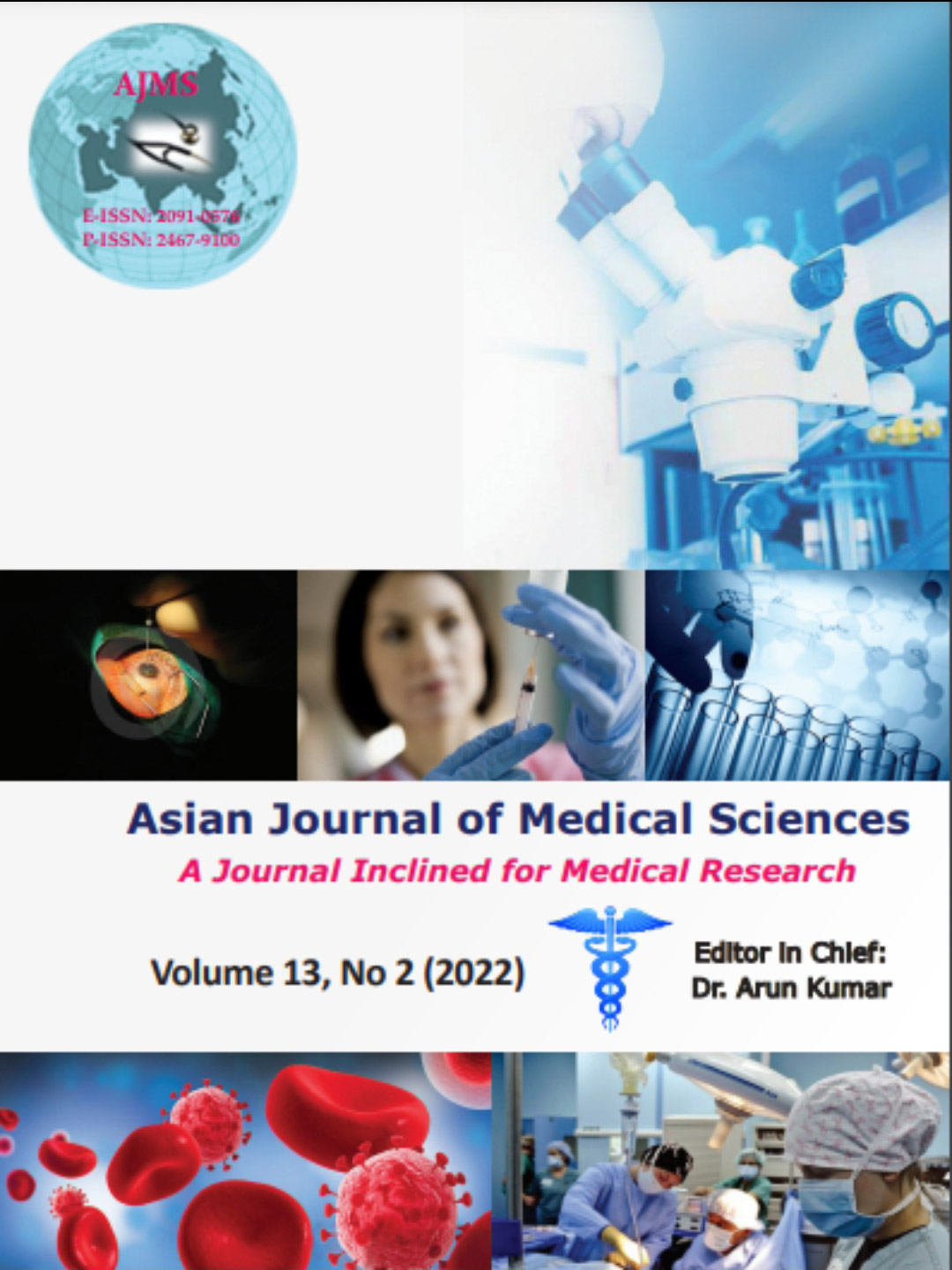 The paper is part of her PhD study of the rising CS rate in Nepal. This systematic review is co-authored with her BU PhD supervisors, Dr. Juliet Wood, Dr. Pramod Regmi and Prof. Edwin van Teijlingen as well as her Nepal-based supervisors Dr. Ganesh Dangel (FHSS Visiting Faculty) and Dr. Keshar Bahadur Dhakal. This is the sixth paper from Sulochana’s interesting and highly topical PhD thesis. The previous five were published in 2018, 2019 and 2021 [2-6].
The paper is part of her PhD study of the rising CS rate in Nepal. This systematic review is co-authored with her BU PhD supervisors, Dr. Juliet Wood, Dr. Pramod Regmi and Prof. Edwin van Teijlingen as well as her Nepal-based supervisors Dr. Ganesh Dangel (FHSS Visiting Faculty) and Dr. Keshar Bahadur Dhakal. This is the sixth paper from Sulochana’s interesting and highly topical PhD thesis. The previous five were published in 2018, 2019 and 2021 [2-6].

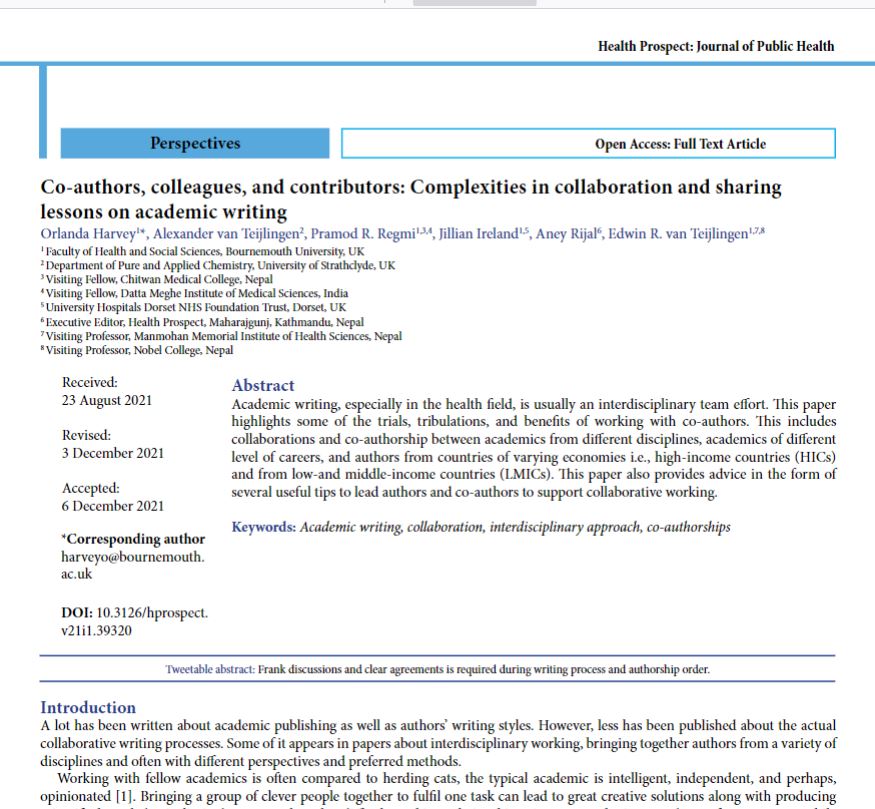
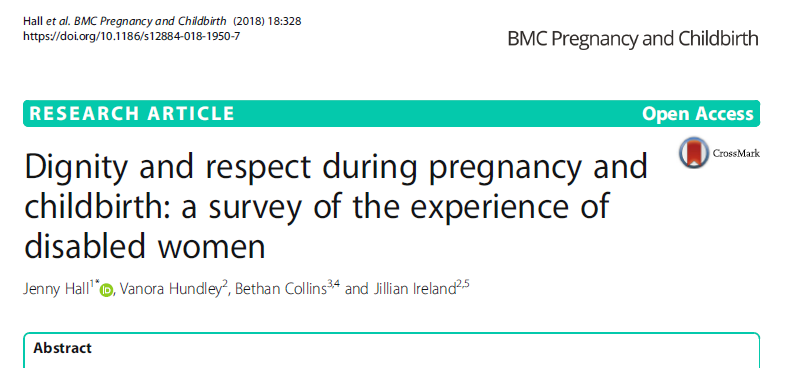
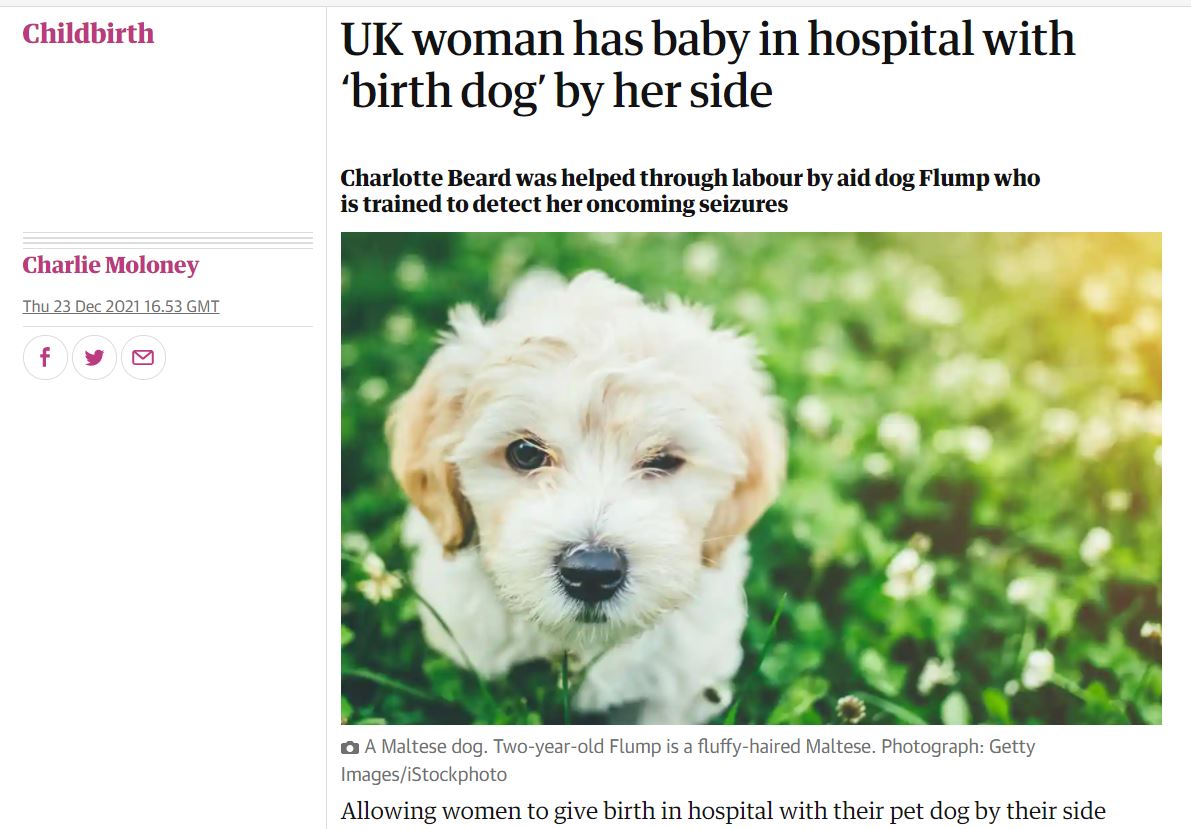
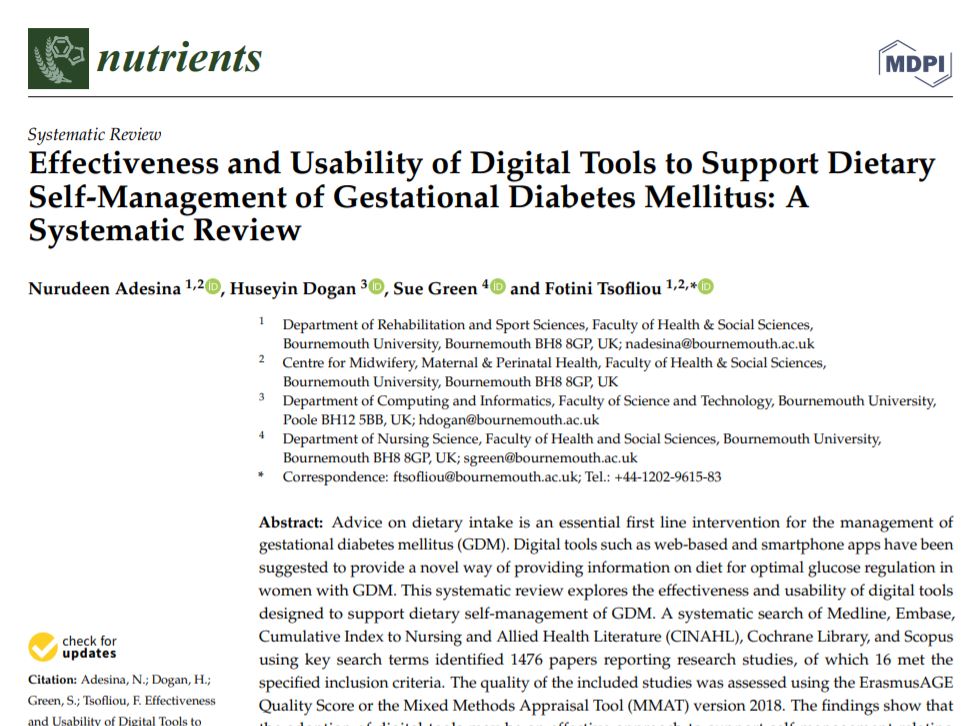

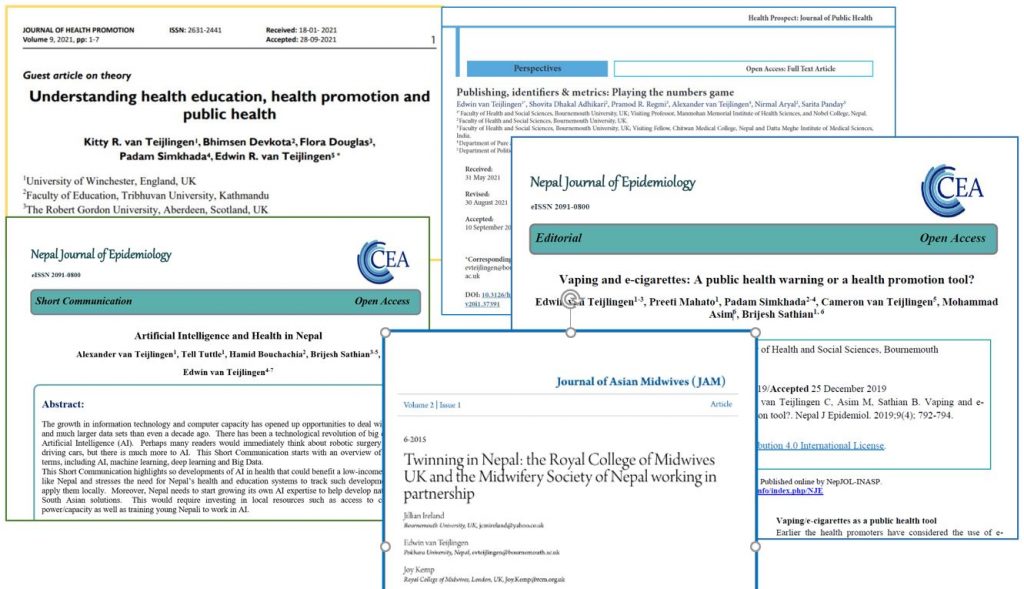

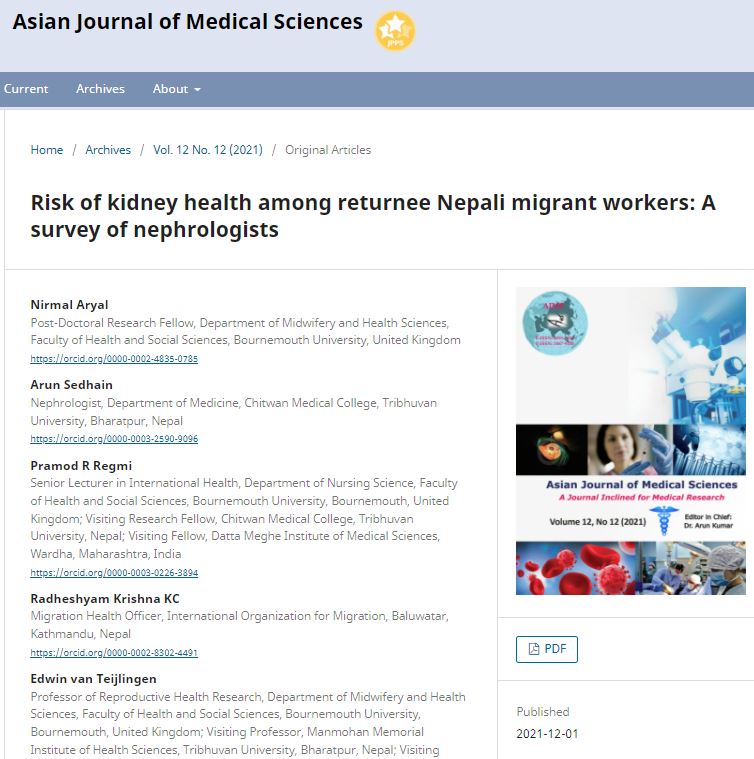

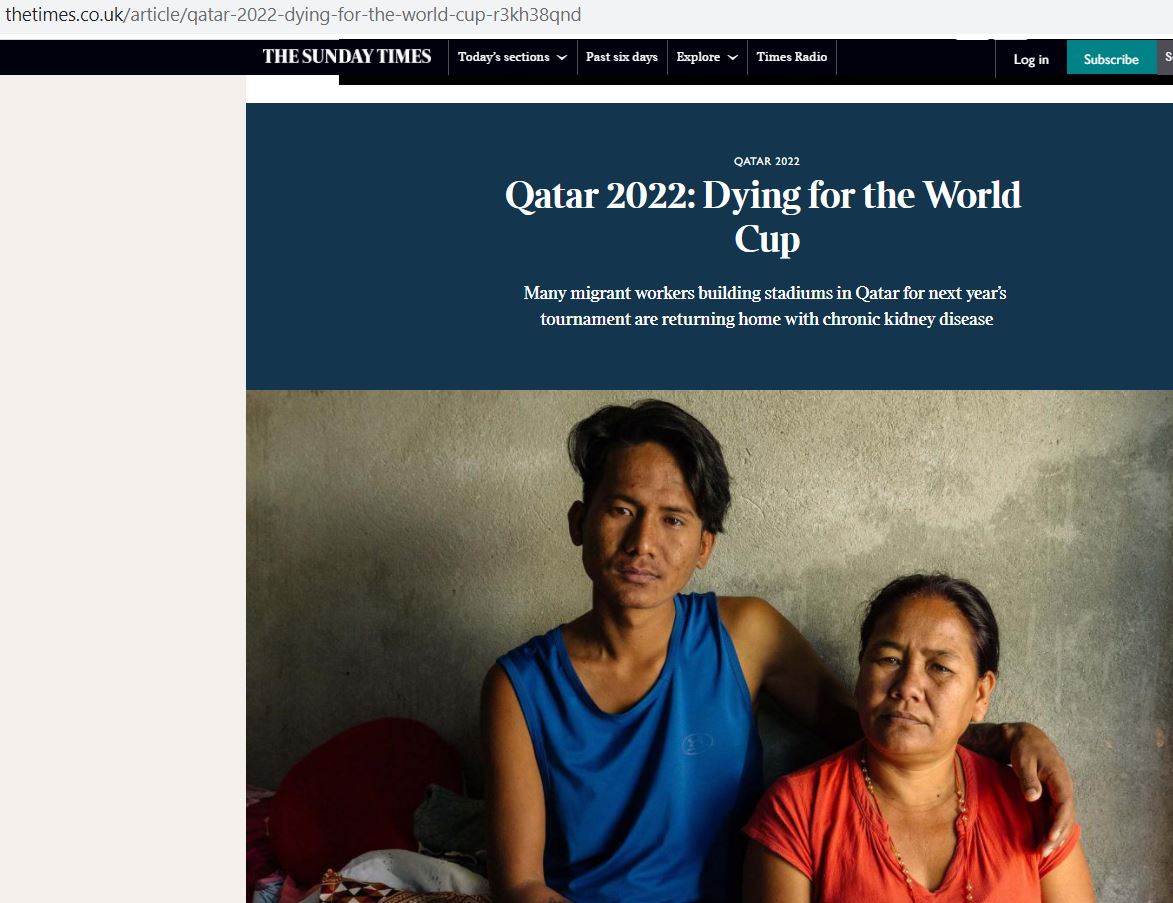

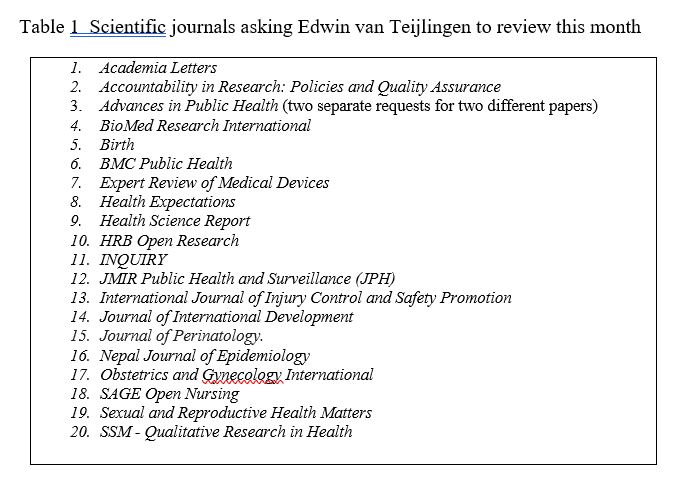











 Dr. Ashraf cited on ‘Modest Fashion’ in The Guardian
Dr. Ashraf cited on ‘Modest Fashion’ in The Guardian NIHR-funded research launches website
NIHR-funded research launches website Academics write for newspaper in Nepal
Academics write for newspaper in Nepal New paper published on disability in women & girls
New paper published on disability in women & girls MSCA Postdoctoral Fellowships 2025 Call
MSCA Postdoctoral Fellowships 2025 Call ERC Advanced Grant 2025 Webinar
ERC Advanced Grant 2025 Webinar Horizon Europe Work Programme 2025 Published
Horizon Europe Work Programme 2025 Published Horizon Europe 2025 Work Programme pre-Published
Horizon Europe 2025 Work Programme pre-Published Update on UKRO services
Update on UKRO services European research project exploring use of ‘virtual twins’ to better manage metabolic associated fatty liver disease
European research project exploring use of ‘virtual twins’ to better manage metabolic associated fatty liver disease